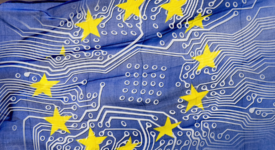With the growing competition posed by US and Chinese firms, the European Commission is considering reviewing its state aid rules to support cutting-edge projects jointly funded by several member states with the aim of strengthening Europe’s industrial might. As calls from several capitals to review the EU rulebook have grown stronger, the EU’s executive is assessing whether to loosen the requirements to facilitate public support for key sectors underfunded by private investors. Some member states have pointed out that the EU’s strict state aid and merger rules have become a straitjacket for companies aspiring to grow and become European champions.
The EU executive eased the rules in 2014, allowing public financing for cross-border research and development initiatives crucial for the future of European industry, as was the case with Airbus in the 1970s. The Commission is currently considering easing the conditions further to support what is sometime referred to as ‘Airbus of the Future’. The latest example of the so-called ‘Important Project of Common European Interest’ (IPCEI) was an initiative funded by seven member states with €3.2 billion in the field of batteries, which was already approved by the executive. “We have found the right recipe for our 21st-century industrial policy: strong cooperation between industrial actors, concerted action to accelerate lab-to-market innovation, joined-up financial instruments from both, private and public sectors, and a fit-for-future regulatory framework to underpin a stronger European knowledge-based economy,” said the Commission’s Vice-President for Institutional Relations and Foresight, Maroš Šef?ovi?.
A total of 19 EU governments have proposed updating the EU’s antitrust rules with the aim of facilitating the emergence of European industrial champions capable of entering into “fierce competition” from the US and China. And Šef?ovi? already forsees ‘an Airbus for batteries, for 5G, AI, green tech’. To achieve this objective, the IPCEI framework is currently under review as part of the “fitness check” launched earlier this year to improve EU regulation and cut red tape. The Commission spokesperson explained that the executive has already “drawn and implemented important lessons” from the first two projects: Apart from the batteries project, there was also an already approved €1.75 billion joint enterprise by France, Germany, Italy and the UK to fund research and development in microelectronics. A third project also related to batteries is in the pipeline with more IPCEI cooperation envisaged for other key technologies, such as hydrogen, low-carbon industrial processes, smart health or cybersecurity.
Article Categories:
ECONOMY & TRADE






